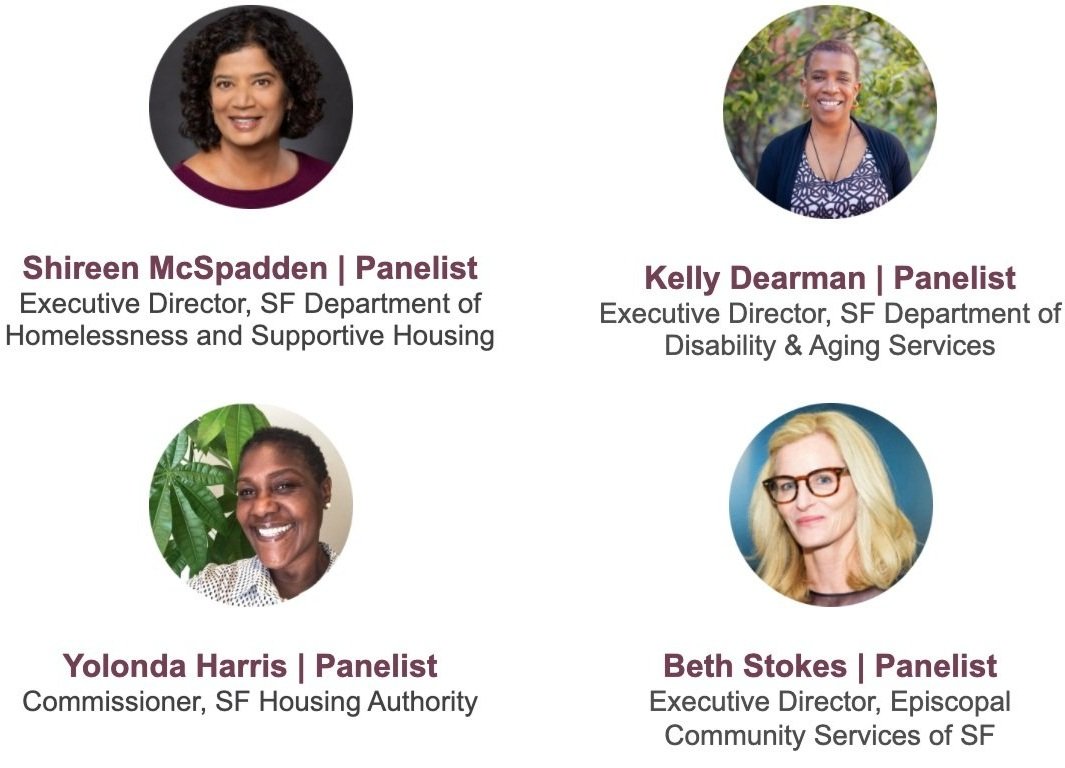
California Master Plan on Aging
Ending Homelessness Among Seniors and People With Disabilities
San Francisco’s first regional forum to discuss implementation of the CA Master Plan for Aging brought attention to the crisis of homelessness among older adults and people with disabilities.
The virtual event held on October 26, 2021, was accessible to all through ASL, live captioning, Spanish and Chinese interpretation and through community watch parties hosted by Curry Senior Center, Episcopal Community Services, PRC, and the Felton Institute.
If you missed the event, you can watch it HERE. For more information about the event and follow-on activities, click here.
Event Overview
Mayor London Breed opened the event with a warm video welcome to the crowd of more than 400 people including homeless, older adult and disability service providers, government leaders, advocates, and older adults who have experienced homelessness and housing insecurity.
Keynote Speaker Dr. Margot Kushel provided data illustrating the severity of the problem, the impact of homelessness on people over age 50, and the top 3 reasons for the crisis in homelessness among seniors and people with disabilities:
1. A lack of access to affordable housing.
2. Emergency shelters that are not age friendly or mobility accessible.
3. A lack of access to home and community-based services.
Dr. Kushel also highlighted the immediate steps that can be taken to address the crisis (see top ten solutions below).
PANEL OF EXPERTS
A dynamic panel of government leaders, service providers, and those who have experienced homelessness highlighted innovative programs underway to increase access to permanent supportive housing and important lessons learned from the pandemic about the benefits of cross-system collaboration.
San Francisco Chronicle reporter Kevin Fagan featured one of these programs in a recent article that emerged from his attendance at the Forum.
Social media highlights continued to run during and after the Masterplan Event, following guidance from Erin Saberi, Open Square Connect | Strategic Communications. See the Social Media Tool Kit here.
Key Takeaways
The San Francisco homeless population is aging. In 1990, 11% of homeless people were age 50 and older. Today, about 50% of San Francisco's homeless population is 50 and older.
44% of homeless adults have their first episode of homelessness after age 50. This same group has a higher mortality rate than others.
The San Francisco homeless population lives with disabilities. The 2019 “point-in-time” count noted that 74% of people experiencing homelessness over the age of 51 had some type of disability.
Homeless adults experience geriatric conditions (cognitive, mobility, hearing, visual impairments, etc.) at a much younger age than others.
The pandemic showed us that we are capable of housing people rapidly, including high-risk older adults and adults with disabilities.
Engaging everyone who participated in the Forum from diverse sectors and across government systems and services is essential to meeting the urgent needs of unhoused older adults and people with disabilities.
Top 10 Solutions
1. @MKushel says: “Provide housing first, then add services based upon individual needs.
2. Make emergency shelters age and disability friendly.
3. Ensure permanent and supportive housing programs are designed to meet the needs of older adults and people with disabilities. @MKushel: “We have a crisis because much of the housing [options]…for extremely low income households are not mobility accessible.”
4. Knowing that older adults who become homeless have much worse outcomes, San Francisco should modify its eligibility requirements for supportive housing to increase the chances of older adults being eligible.
5. Build collaboration and integration between aging, disability and homeless services, including between the Department of Homelessness and Supportive Housing, the Department of Disability and Aging Services, and the Department of Public Health. @ShireenMcSpadden “We can tailor our programs to better meet needs of people experiencing homelessness and lower barriers to accessing what is available.”
6. “We have work to do in the intersection of mental health disabilities and aging as well as cognitive impairment.” @MKushel
7. Create a pipeline for getting older adults off the streets and into permanent supportive housing. Click here to see a great example: The newly launched Collaborative Caregiver Support Team (CCST).
8. Provide adequate resources for time intensive case management services that work.
9. Dedicate more resources to eviction prevention.
10. Older adults and adults with disabilities experiencing homelessness should be part of the decision-making process.
Stay Involved
Follow up for the Master Plan will be undertaken with support from the San Francisco Long-Term Care Housing Task Force. For more information contact Jessica Lehman.
The California Master Plan for Aging (MPA), developed with the input of many leaders and advocates in older adult and disability services in the San Francisco region and released by the Newsom Administration in January 2021, outlines five bold goals and twenty-three strategies for implementation by state and local government, communities, and private and philanthropic organizations, including a focus on ensuring housing with appropriate supports and services for older adults and people with disabilities.
Further Resources
CA MASTERPLAN ON AGING
BACKGROUND
Aging Among the Homeless Population: Causes, Consequences and Solutions, Dr. Margot Kushel
Building a Conversation: Aged Homelessness on the Rise, National Alliance on Homelessness
Aging Veterans: Community Strategies for Complex Needs, Swords to Plowshares
SAN FRANCISCO: Issues & Resources
Long Term Care Council of San Francisco: 21-22 Policy Agenda
If You Don’t Have a Home, You Don’t Get Services: Addressing the Unmet Needs of Senior and Disabled Homeless, Dept. of Disability and Aging Advisory Council
Our City, Our Home Oversight Committee - Investment Plan for Fiscal Years 20-21, 21-22, 22-23
Stop the Revolving Door Coalition on Homelessness: A Street Level Framework for a New System
Summary of Results from the Coalition on Homelessness Survey
Healthy Model of Care, Episcopal Community Services
Other Communities
From San Diego Serving Seniors - Senior Homelessness: A Needs Assessment , Sept. 2021





